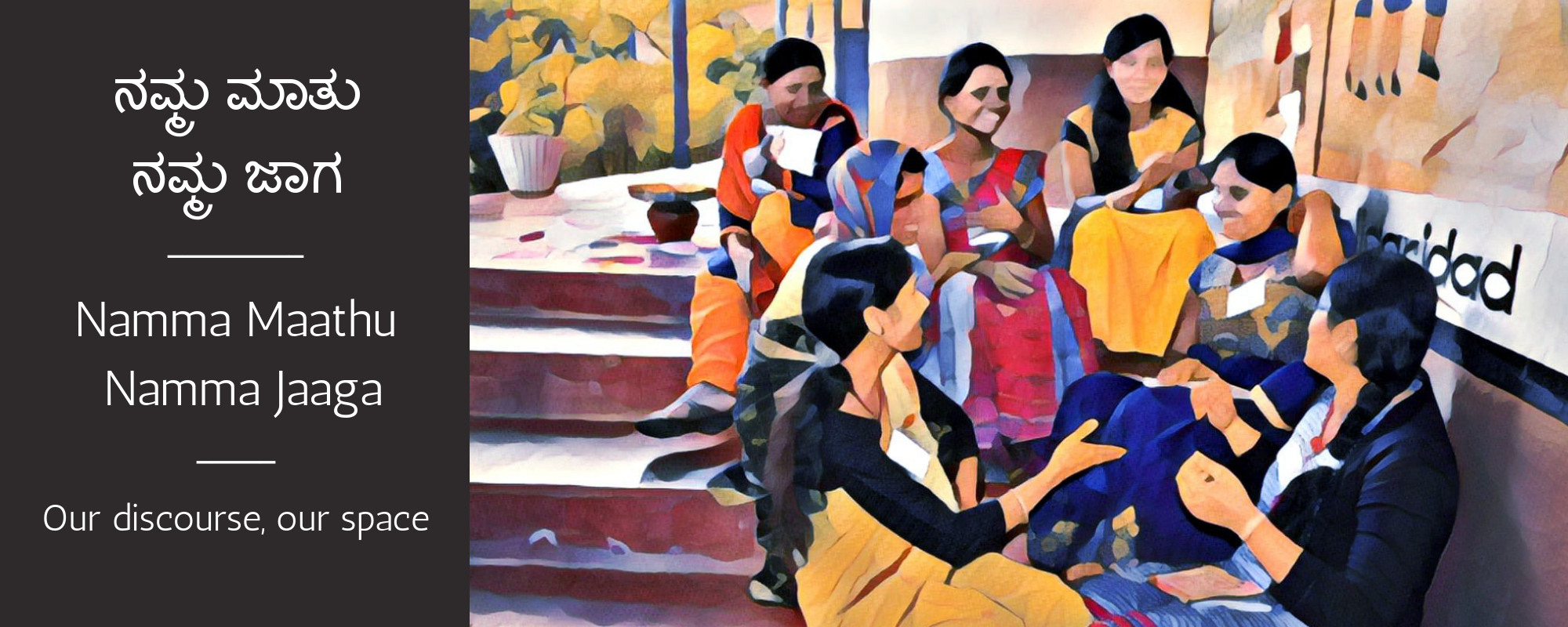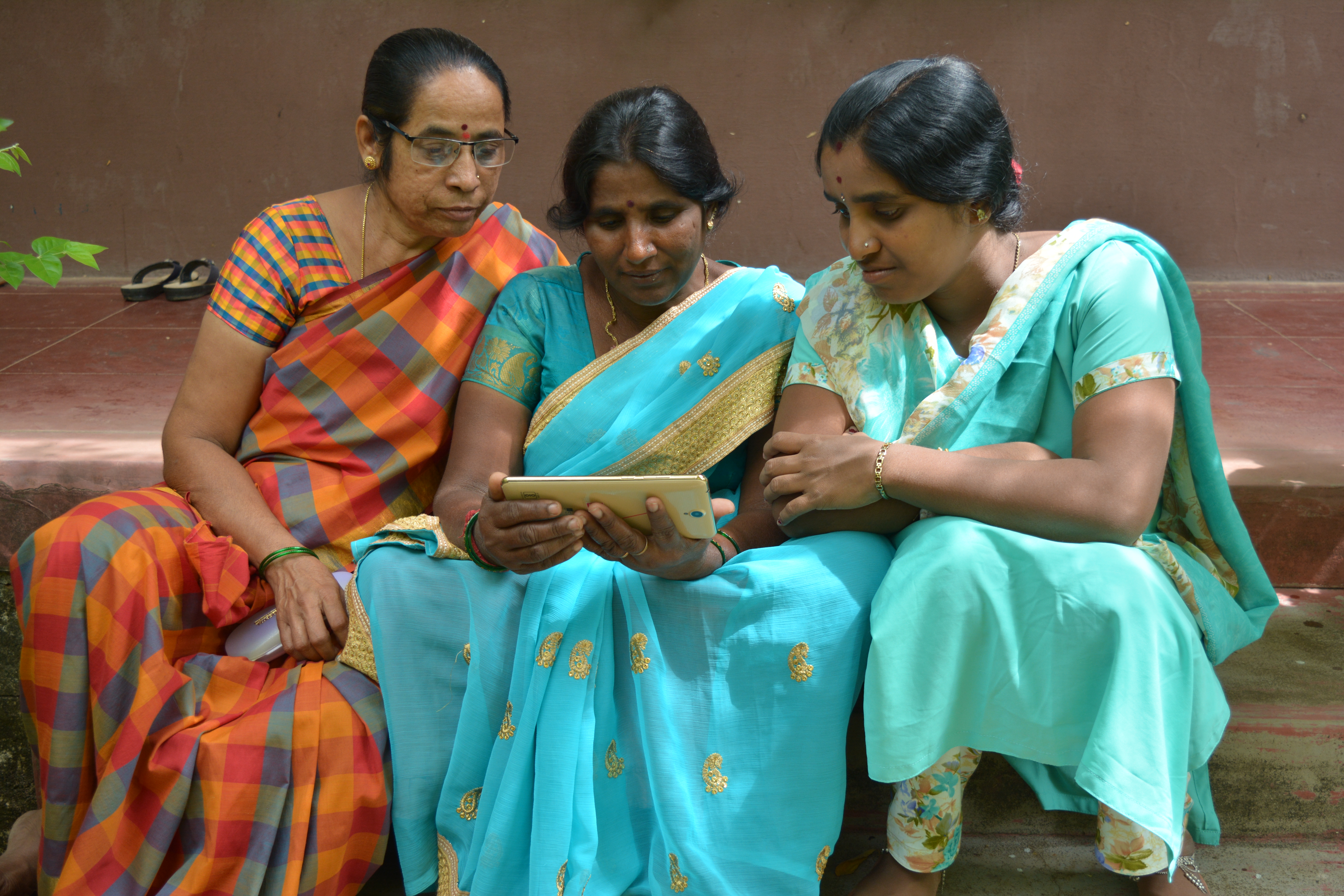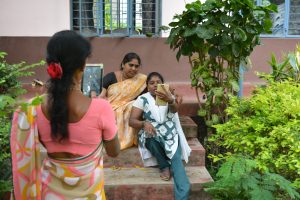
Paracounselors training: Part II
Sarada Mahesh | November 2018
Paracounselors were trained to provide women with options to help them, connect with institutional support and most importantly, to help provide emotional stability to the women

The month of November saw the second para-counseling training being organized in HD Kote. The training saw the attendance of 32 aganwadi counselors, who also work as para-counselors, who provide support to women facing domestic violence.
We began by showing the participants a video containing the pictures from the previous session in August. The women smiled as they remembered the discussions, activities and interactions that had taken place then. The trainers from Samvada then welcomed the women, who eagerly shared that they were glad to be back again. They began the session by asking the women to close their eyes and relax, and think of different aspects of their life that they were grateful for. The sessions then went on for three days in full swing.
The women agreed that the training had helped them feel more empowered, and this changed the way they dealt with the cases in their villages.
The trainers then asked the women for their feedback from the previous session – did they find it useful, were they able to use the learnings in the real world context and if so, how did it help and what obstacles did they face in the process? The women agreed that the training had helped them feel more empowered, and this changed the way they dealt with the cases in their villages. They passionately explained their experiences of standing up for couples who chose to go into inter-religious marriages, and against husbands who tried to force their wives into sex-selection tests. The training had also introduced them to institutions such as Myrada, a grassroot level organization working in Mysore, whose help they sought while dealing with these issues.
Stepping into the shoes of another is one of the ways by which individuals can gain an understanding about situations. The participants were told to do role plays of everyday issues faced in the village and how they would go about resolving it. The intent of this activity was to give the women the opportunity to speak their minds out; to give them a safe space to share their ideas and thoughts for which they may have wanted to share in their villages, but did not do so, for the fear of being judged by their community members. Additionally, these role plays would serve as a way to help the women relax. Instances were enacted on issues such as women choosing to exercise their reproductive rights by choosing not to have children and how, with the help of the Anganwadi worker, they stand up for themselves against the opposing husband.
 What flowed from these role plays were discussions on related issues such as how it was possible for women to stand up for their choices, while also factoring the opinion of their husbands. As para-counselors, Kirana (the trainer from Samvada) explained, they had to take on the role of non-judgemental supportive systems. Their duty was to provide women with options, to help them, connect with institutional support and most importantly, to help provide emotional stability to the women.
What flowed from these role plays were discussions on related issues such as how it was possible for women to stand up for their choices, while also factoring the opinion of their husbands. As para-counselors, Kirana (the trainer from Samvada) explained, they had to take on the role of non-judgemental supportive systems. Their duty was to provide women with options, to help them, connect with institutional support and most importantly, to help provide emotional stability to the women.
Some of the participants then began to explain how it was difficult to be completely neutral or non-judgemental. Living in a small community, they were bound to know details about every household, leading to them develop prejudices of their own against individuals. Understanding that this might be a valid problem, Ishrat (the second trainer from Samvada) explained that one of the ways that could help them be non-judgemental is by hearing both sides of the story – that of the husband and the wife. It was important to understand the history of the case as well. This would also help them explain the case better to the institutions that they would refer the woman to, who in turn could provide concrete and precise support based on the facts.
With just a snap of the finger, the panchayat members could have their own way. If they did not believe in the fight that the para-counselors were fighting, it was difficult to get anything in the favour of the women. Training the Panchayat leaders about the importance of an issue as sensitive as domestic violence and the non-judgemental, institutional way of handling it was important.
But bigger forces stood as obstacles for the para-counselors. With just a snap of the finger, the panchayat members could have their own way. If they did not believe in the fight that the para-counselors were fighting, it was difficult to get anything in the favour of the women. Training the Panchayat leaders about the importance of an issue as sensitive as domestic violence and the non-judgemental, institutional way of handling it was important.
Sometimes we are criticized for interfering in the matters of another family despite out good intentions, a para-counselor lamented. Criticism is unavoidable, explained Kirana. But criticism can also be looked at as constructive feedback, a way for the para-counselors to improve themselves and their counseling skills. As long as they continued to work and believe in the cause of ending violence against women, eventually the community would come to understand and support their efforts. Additionally, they should constantly seek institutional support, be it that of Prakriye, Santhwana or the police station.
Finally, the trainers reminded the para-counselors that small actions mattered while counseling, such as the tone and voice used by them while talking to the woman. In order for the woman to be ready to share intimate aspects of her life, particularly that of violence inflicted against them.
The training ended with the participants thanking the trainers and the sakhis and team members of Prakriye for the learnings that they were able to inculcate in the past three days. They each agreed that the training had helped them feel more encouraged to deal with the issues that they would have to help resolve in their respective villages.